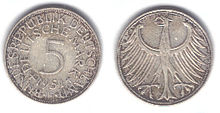Heiermann
The term Heiermann is colloquially used in some areas of Germany for the 5- mark piece, now rarely also for the 5-euro note . The word originated in the north German- speaking area at the beginning of the 20th century , but according to anecdotal evidence it spread at least to the Rhineland.
Occasionally (in Krefeld ) the 50- pfennig piece is said to have been referred to as the “Heiermännchen”.
Origin of the term
There are several conjectures about the origin of the term. The etymologically most reliable variant says that the term originated from the Hebrew letter ה ("He", in Yiddish pronunciation "Hey"). In Hebrew , every letter has also stood for a number since biblical times, with the ה ("He") being the fifth letter of the alphabet for "five".
Other widespread derivations refer on the one hand to the term Heuer : Around 1900 five gold marks were a common amount that seafarers received as hand money. On the other hand, it should - it is out of the red light district rumored - in the early 1950s, the DM have had such a high purchasing power that seafarers on the Reeperbahn in Hamburg for five marks in a brothel could go. Since " making heia " means "to sleep " in some dialects , the five-mark piece was called "Heiermann" (Heiamann); however, it does not fit the fact that the term was already used at the beginning of the 20th century.
Attempts to explain the name of the former Federal President Gustav Heinemann are implausible , as this was never depicted on a coin and the term was known long before Heinemann took office (1969).
literature
- Friedrich Kluge: Etymological dictionary of the German language . 24th edition. de Gruyter, Berlin 2002, article: Heiermann . ISBN 3-11-017473-1 .
- Thorsten Weiland: The Hundeshagener Kochum. A Rotwelsch dialect used by hiking musicians from Eichsfeld. Sources - Dictionary - Analysis . Schöningh, Paderborn 2003, ISBN 3-506-79706-9 . The book contains pp. 149f. an article on Heiermann , in which the use of the word in Kochum and, more generally, its etymology is treated.
Individual proof
- ↑ a b Peter Honnen, Martin Schott (Krefeld), Harald Einig (Ochtendung) (May 2007 at the latest): Heiermann. Rhenish hands-on dictionary (accessed July 25, 2010)
